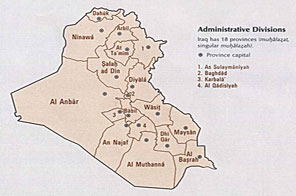Iraq to reinstate 20,000 Saddam-era officers
BAGHDAD: The Iraqi military will reinstate 20,000 Saddam Hussein-era army officers who were dismissed from their posts after the 2003 U.S.-led invasion for serving under the former dictator, an Iraqi defense spokesman said Friday.
The announcement, a little over a week before the March 7 parliamentary elections, immediately raised questions about whether the move was timed to pump up votes for Prime Minister Nouri al-Maliki.
Defense Ministry spokesman Mohammed al-Askari said the move was not related to the balloting, but was simply a matter of timing because funding for the jobs became available.
"This measure has nothing to do with elections, rather it is related to budget allocations," he said.
But that explanation held little sway with Sunni lawmakers who called it a blatant ploy by al-Maliki to win more votes.
"No doubt, this move is related to the elections and it aims at gaining votes," said Maysoun al-Damlouji, a candidate from a secular block headed by former prime minister Ayad Allawi, a fierce critic of al-Maliki.
A defense ministry statement said the rehired officers would be reinstated as of Sunday, meaning they would be allowed to vote in the election.
What to do with officials from the ruling Baath party has been a key cause of concern for post-war Iraq. Hundreds of thousands were purged from government jobs under a controversial program by the U.S. Coalition Provisional Authority and Saddam's army was disbanded, decisions that were widely blamed for setting in motion the Sunni insurgency.
Although many were allowed to return to government service in 2008, the treatment of former Baath party members has increasingly become a source of tension as the election approaches.
At the same time the officers are being rehired, there has been a controversial purge of more than 440 suspected Saddam loyalists, mostly Sunnis, from the upcoming ballot. That purge was ordered by a committee led by two prominent Shiite lawmakers who are believed to have ties to Iran and also are running in the election.
One of those was prominent Sunni lawmaker, Saleh al-Mutlaq. He announced Thursday that his party, the National Dialogue Front would rejoin the parliamentary elections, less than a week after pulling it from the race in protest over the ban.
The decision effectively lifts the lingering threat that minority Sunnis would boycott the vote, which the U.S. hopes will bolster national reconciliation efforts and pave the way for American combat forces to go home.
In yet another twist on Friday, the spokesman of the Shiite-led political vetting committee that drafted the blacklist, Mudhafar al-Batat, said the committee would file a lawsuit against al-Mutlaq for his alleged involvment in attacks and killings carried out by insurgent groups linked to Baath party.
The Sunni lawmaker, who heads an 11-member block in the outgoing legislature, has repeatedly denied any links to the insurgency and claimed he quit the disbanded party in the 1970s.
Iraq's Prime Minister Nuri al-Maliki (C, at podium) addresses tribal leaders from Salahuddin province during a rally promoting the candidates of State of Law coalition in Baghdad February 26, 2010. Iraq will hold parliamentary elections on March 7.






